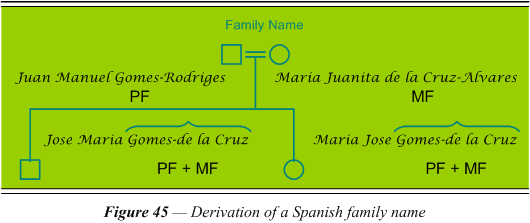FNPPF + MF
3.4 Family and clan names. The family name is the name carried by a nuclear family that children born into may assume as a surname. The affixes attached to a given name may indicate a patronymic e.g., –son, –dotter in Swedish. In this way the LEXICON contains an entry for Hans indicating that it is a masculine given name. This classification allows one to predict through a rule of derivation that a patronymic (surname) may form from it, by the addition of one of these special suffixes, depending on the gender of the child: e.g., Hansson (m.), Hansdotter (f.). In Celtic (Irish and Scottish) the patronymic is formed by the use of a prefix, O’–, Mac–, Mc–, M’–. There is no gender distinction for these prefixes, though sometimes they are written as particles. The patronymic particle in Welsh is written as a separate word, but agrees in gender with the child’s given name. Thus there is ab (m.) before words beginning with a vowel, ap (m.) before words beginning with a consonant, and verch (f.) for the more modern spelling merch. And so the patronymic is usually specific to the gender of the person possessing it; it is a gender specific family name derived from the given name of the father in the family.
Individuals may use one or more family names for surnames (cf. compound surname, and Latin surname). Let the patrilineal family name be one of the surnames of the father that is part of the family name. A child born into the family may use a patrilineal family name for part of its surname. Similarly let the matrilineal family name be one of the surnames of the mother that is part of the family name. A child born into the family may also use a matrilineal family name for another part of its surname. This situation would motivate a new PS-RULE for family names, say
FNPPF + MF
for Spanish families and
FNPMF + PF
for the Portuguese, where
PFSN
and
MFSN.
When a couple begins a family, whether Portuguese or Spanish, the compound surnames of both spouses contribute to the composition of the family name.

The clan name is the name carried by a clan, which is essentially the equivalent of a tribe. Children born into the clan, people married into the families of the clan, or people incorporated into the clan perhaps through some calamitous event, may assume this name as a surname. Individuals thus use the clan name for what in many other cultures is a surname. Essentially a clan name is the name of a certain social institution. This kind of name would have its own set of PS-RULES to describe it, say Norg. Among the Native Americans, Africans, Aborigines, etc., this is what is called a tribe. It may be immaterial whether such a name was ever in a particular culture accepted as a “surname” per se. Deriving a surname from such a name is nevertheless useful to distinguish persons of different ancestry.
